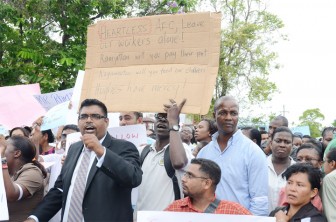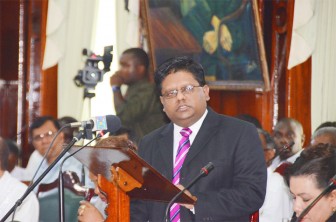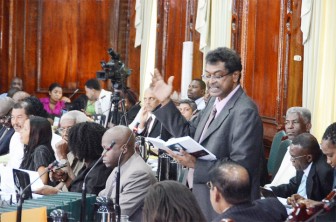By far the most significant outcomes of Guyana’s 2011 general elections was the loss of its parliamentary majority by the ruling People’s Progressive Party/CIVIC and the emergence of the Alliance for Change (AFC) as a critical power broker in the National Assembly. The occurrence marked a historic turning point in a parliamentary ‘arrangement’ that had seen the government have its own way in the National Assembly since the country became independent in 1966. The passage of legislation by the executive became a matter of formality, a circumstance that has always caused the nation’s parliament to appear all the more farcical.

No one was particularly surprised over the PPP/C’s victory at the 2011 polls through A Partnership for National Unity (APNU) did stage demonstrations over some glitches in the GECOM’s administrative and ballot-counting processes. Rather than ponder the result of the poll, however, political parties and the public alike appeared far more focused on the fact that the results had handed the opposition political parties a one-seat majority in the National Assembly.
Inevitably, talk of the opposition using its majority to bring the government ‘under manners’ in the Parliament surfaced, though hopes of a permanently united opposition never seemed likely. APNU and the AFC might, from time to time, find common cause on parliamentary issues, but it cannot be overlooked that both prior to and subsequent to the general elections, the AFC, which is headed by former PPP high-flier Khemraj Ramjattan, had been careful to put some distance between itself and APNU. Certainly, the AFC not only made it clear that it not about to embrace APNU’s threatened rejection of the election results as issued by GECOM, but it also steered clear of APNU’s post-elections protest.

The point about the APNU and the AFC not necessarily being joined at the hip is important if only because the one-seat majority which the two parties hold in the National Assembly had come to be seen in some quarters as a stick with which to beat the back of the government. That, as the events that attended the 2012 budget debate made clear, is not going to be the case. While the two political parties eventually managed to find common ground on budget cuts, a meeting between APNU leader David Granger and President Donald Ramotar to discuss the stalemate that had arisen in the National Assembly over the budget had the effect of creating some icy moments between Granger and Ramotar.
From all indications this is likely to happen time and again in the future since while the two parties have interests in common particularly as those that relate to what they perceive as governance deficiencies within the PPP/C that have been inherited by President Ramotar from his predecessor, they have separate substantive internal agendas.

On APNU’s side there is the matter of a brooding People’s National Congress /Reform, many members and supporters of which have made no secret of the fact that the party was forced into a coalition to contest to the 2011 elections not so much because it meant additional numbers at the polls but because it helped to sanitize a shabby image. With the poll over the PNC/R has made it clear that it has no wish that its name be forever subsumed beneath that of APNU.
Then there is the issue of the leadership of the PNC/R and whether or not Granger, who holds the constitutional position of Leader of the Opposition will be elected to the leadership of the PNC at its Congress later this year. The word from the Party’s Sophia headquarters is that Granger is by no means a shoo in for the party leadership and how his failure to secure party leadership will impact on his performance as Leader of the Opposition is difficult to say.
The argument that the AFC was, in a sense, the real winners at the 2011 general elections is not a particularly difficult one to make. The PPP/C may have retained the executive but its loss of control of the National Assembly amounts to a major blow for the Party and had even given rise to talk of a snap elections some time this year. The PNC/R, on the other hand, even under the broader APNU umbrella, has once again been denied political office and now, as a single political party, occupies fewer seats in the National Assembly than in did in the Ninth Parliament. By contrast the AFC has not only increased its share of the popular vote, challenging the PPP/C in some of its key constituencies but has also become a genuine power broker in the Parliament.
The recent parliamentary debate on the 2012 budget provided a foretaste of what probably lies ahead in terms of the kind of cut and thrust politics to which Guyana is altogether unaccustomed. The absence of an executive that no longer has dual control that includes a majority in the National Assembly opens up the political landscape to more intense debate both inside and outside the Parliament and imposes upon the executive the requirement of greater accountability in circumstances where the lack thereof has, over the years, lent a farcical touch to democracy.
Just days ago, as the debate in Parliament over the 2012 budget raged, Guyanese were treated to the peculiar sight of rank and file state workers alongside Ministers of Government and other senior public officials staging public demonstrations over opposition threats to vote for cuts in the budget brought to the National Assembly. The government had justified calling its public servants out onto the streets by declaring that budget cuts in effect meant that jobs would be lost –though opposition politicians were insisting that it was not job losses but the loss of the facility for profligate spending that had rattled the administration.
In a sense the budget debate was a sort of baptism of fire for APNU and perhaps more importantly for Opposition Leader David Granger whose consultations with President Ramotar during the debate demonstrated that the parliamentary opposition was now enjoying a new-found and significant political influence. What it did too was to illustrate the sorts of tensions that might arise between the the two opposition political parties from time to time given the small squall between Granger and Ramjattan over some of the reported outcomes of Granger’s meeting with the President. All of this is of course new territory for a country which, during its forty six years of independence, had grown accustomed to an unfettered executive and an opposition which, for the most part, served as little more than political window-dressing. It is a change that will take some getting used to.








